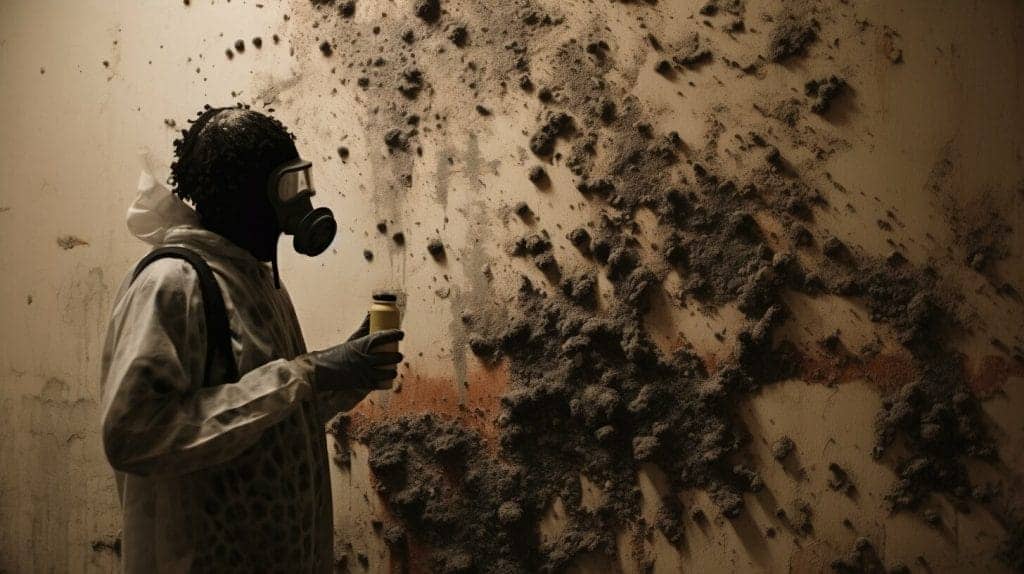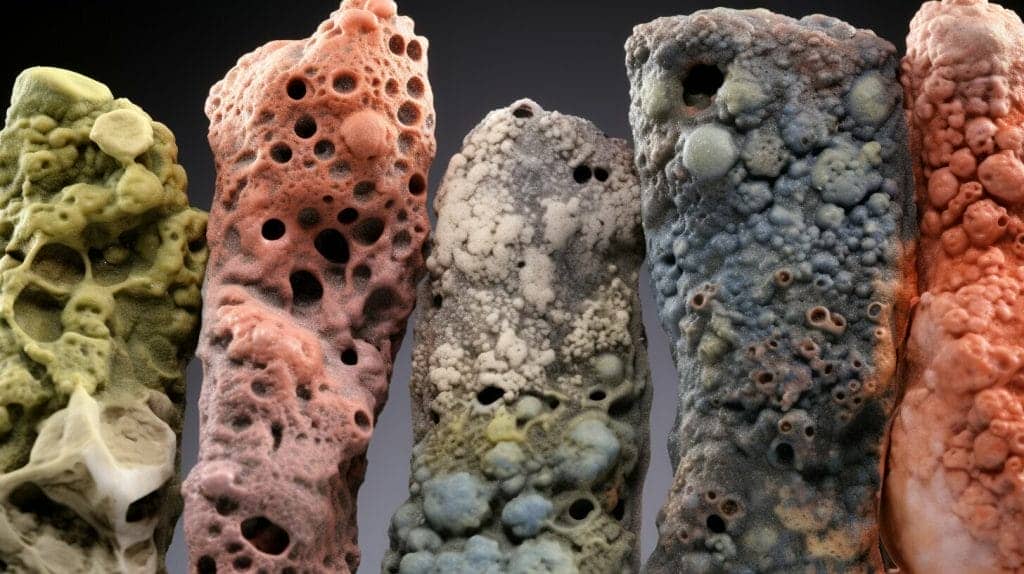Mold is a common household problem that can pose serious health risks, particularly with prolonged exposure. One of the less known dangers of mold exposure is its impact on oxidative stress levels in the body. Oxidative stress occurs when there is an imbalance between free radicals and antioxidants in the body, leading to cellular damage. Mold exposure has been found to trigger oxidative stress in the body, exacerbating the health risks associated with mold exposure.
This article aims to provide an overview of mold-induced oxidative stress, its impact on health, and practical solutions for preventing and managing it. It will also introduce Oasis Medical Institute, a leading institution offering holistic treatments for mold toxicity and oxidative stress.
Key Takeaways:
- Mold exposure can lead to oxidative stress, which occurs when there is an imbalance between free radicals and antioxidants in the body.
- Oxidative stress can exacerbate the health risks associated with mold exposure, leading to chronic inflammation, immune dysfunction, and neurological disorders.
- Preventing and managing mold-induced oxidative stress involves identifying and addressing sources of mold in the environment, improving ventilation, maintaining optimal humidity levels, and implementing proper cleaning and maintenance practices.
- Oasis Medical Institute offers a comprehensive, holistic treatment program for mold toxicity and oxidative stress, led by renowned physician Dr. Francisco Contreras MD.
Understanding Mold-Induced Oxidative Stress
Mold-induced oxidative stress is a process by which exposure to mold spores triggers the production of free radicals in the body, leading to oxidative damage and inflammation. This process occurs when mold spores are inhaled, ingested, or come into contact with the skin.
Free radicals are unstable molecules that can damage cells and contribute to a range of health problems, including chronic inflammation, immune dysfunction, and neurological disorders.
When mold spores enter the body, they can trigger an inflammatory response that leads to the production of free radicals. This, in turn, can cause damage to cellular structures and DNA, leading to oxidative stress.
Oxidative stress caused by mold exposure can exacerbate the health risks associated with mold exposure, including respiratory issues, allergies, and fatigue. It can also increase the risk of developing chronic health problems over time, such as autoimmune diseases and cancer.
Specific Mechanisms of Mold-Induced Oxidative Stress
Mold-induced oxidative stress occurs through several specific mechanisms. One of the primary ways in which mold spores trigger oxidative damage is through the activation of the immune system’s inflammatory response.
When the immune system detects the presence of mold spores, it releases a series of chemicals and immune cells that are designed to attack the invader. In the process, these chemicals and cells can damage healthy tissues and produce free radicals.
In addition to triggering the inflammatory response, mold spores can also directly produce free radicals through the production of mycotoxins. Mycotoxins are toxic substances that are produced by certain types of mold, and they can be particularly damaging to cellular structures and DNA.
Overall, mold-induced oxidative stress is a complex process that involves both direct and indirect mechanisms of free radical generation. By understanding how mold exposure leads to oxidative damage, individuals can take steps to minimize their risk of exposure and reduce their overall health risks.
Health Effects of Mold-Induced Oxidative Stress
Mold exposure can lead to a variety of health problems ranging from minor respiratory issues to chronic conditions. When mold spores are inhaled, they trigger an immune response that can result in inflammation and oxidative stress. Over time, this can weaken the body’s defenses and increase the risk of chronic inflammation, immune dysfunction, and neurological disorders.
The effects of mold-induced oxidative stress can be both short-term and long-lasting. Short-term symptoms may include coughing, sneezing, watery eyes, and fatigue. In individuals with pre-existing respiratory conditions, mold exposure can exacerbate asthma and other breathing disorders. Long-term health risks associated with mold-induced oxidative stress include chronic fatigue syndrome, fibromyalgia, autoimmune disorders, and cancer.
Children, the elderly, and individuals with weakened immune systems are particularly vulnerable to the health effects of mold-induced oxidative stress. It is important to take steps to prevent and manage mold exposure in order to protect overall health and well-being.
Preventing Mold-Related Oxidative Stress
Mold-induced oxidative stress poses a serious health risk, but there are practical steps that individuals can take to prevent it. By reducing exposure to mold and implementing healthy environmental practices, it is possible to minimize the threat of oxidative stress. Here are a few ways to prevent mold-related oxidative stress:
| Tip | Description |
|---|---|
| Identify and address sources of mold | Check for moisture problems in the home, such as leaks or condensation, and promptly address them to prevent mold growth. Use dehumidifiers and air purifiers to control indoor humidity levels and improve air quality. Regularly clean and maintain HVAC systems to prevent mold buildup. |
| Improve ventilation | Ensure proper ventilation in all areas of the home, particularly in bathrooms, kitchens, and basements. Open windows and doors when possible to increase airflow and reduce indoor humidity levels. Use exhaust fans to remove excess moisture from the air. |
| Maintain optimal humidity levels | Keep indoor humidity levels between 30-50% to prevent mold growth and reduce the risk of oxidative stress caused by mold. Use a hygrometer to monitor humidity levels and adjust as needed. |
| Implement proper cleaning and maintenance practices | Regularly clean and disinfect surfaces prone to mold growth, such as bathrooms and kitchens. Use mold-resistant products in areas at high risk of mold growth, such as shower curtains and bath mats. Promptly address any mold growth that does occur to prevent further spreading. |
By following these guidelines and utilizing effective mold prevention methods, individuals can reduce the risk of mold-induced oxidative stress and promote overall health and wellness.
Managing Mold-Induced Oxidative Stress
To effectively manage mold-induced oxidative stress, individuals can take proactive steps to minimize mold exposure and incorporate lifestyle modifications that support overall health and wellness. These strategies can help mitigate the impact of oxidative damage in the body and reduce the risk of long-term health consequences.
Identify and address sources of mold: Regularly inspect indoor environments for signs of mold growth such as musty odors, discoloration, or water damage. Promptly address any issues and undertake thorough cleaning and remediation efforts. Consider hiring a professional mold inspector to assess the presence of mold and develop an appropriate course of action.
Improve ventilation: Proper ventilation can help reduce the concentration of mold spores in the air and prevent excessive moisture buildup. Use exhaust fans or open windows when showering or cooking, and ensure that air ducts and filters are cleaned and maintained regularly.
Maintain optimal humidity levels: Mold thrives in damp environments, so it is important to maintain relative humidity levels below 60%. Use a dehumidifier in humid areas such as basements or bathrooms, and ensure that any water leaks or plumbing issues are promptly addressed.
Implement proper cleaning and maintenance practices: Regular cleaning can help reduce mold spore levels and minimize exposure. Use mold-inhibiting cleaning products, and ensure that surfaces are kept dry and well-ventilated. Regularly replace air filters and vacuum carpets and upholstery to minimize dust accumulation.
Adopt a holistic approach: In addition to minimizing mold exposure, individuals can adopt a holistic approach to support overall health and resilience against the impact of oxidative stress. This can include maintaining a healthy diet rich in antioxidant-rich fruits and vegetables, regular exercise, stress reduction techniques, and other lifestyle modifications that promote well-being.
By taking proactive steps to manage mold-induced oxidative stress, individuals can safeguard their health and reduce the risk of long-term health consequences.
The Connection Between Mold Toxicity and Oxidative Stress
Mold toxicity is a serious health concern that can have long-lasting effects on an individual’s well-being. However, the dangers of mold exposure do not stop at toxicity. Studies have shown that mold exposure can lead to oxidative stress, which can exacerbate the health risks associated with mold exposure.
Oxidative stress is a condition in which the body experiences an imbalance between the production of free radicals and the body’s ability to neutralize them. This imbalance leads to cellular damage, which can contribute to a wide range of health problems. When it comes to mold-induced oxidative stress, research has demonstrated that mold spores can trigger the production of free radicals, leading to oxidative damage in the body.
The combination of mold toxicity and oxidative stress can significantly increase the risk of health problems. Individuals who have been exposed to mold may experience short-term symptoms such as allergies, respiratory issues, and fatigue. However, over time, exposure to mold can contribute to chronic inflammation, immune dysfunction, and neurological disorders, all of which can be exacerbated by oxidative stress.
| Risks of Mold-Induced Oxidative Stress |
|---|
| Chronic inflammation |
| Immune dysfunction |
| Neurological disorders |
It is important to address both mold toxicity and oxidative stress to achieve optimal health outcomes. This may involve identifying and removing sources of mold in the environment, implementing proper cleaning and maintenance practices, and managing oxidative stress through lifestyle changes, dietary modifications, and supplementation.
At Oasis Medical Institute, a holistic approach is taken to address mold toxicity and related oxidative stress. By utilizing a combination of traditional and alternative medicine, Dr. Francisco Contreras MD and his team provide a comprehensive treatment program that addresses both mold toxicity and oxidative stress. This integrative approach promotes overall wellness, helping individuals achieve optimal health outcomes.
As research continues to explore the link between mold-induced oxidative stress and health, it is important for individuals to take proactive steps to protect their health and well-being. By seeking out professional guidance and implementing preventive measures, individuals can safeguard themselves against the hidden threat of mold-induced oxidative stress.
Oasis Medical Institute: A Holistic Approach to Mold Toxicity Treatment
For those seeking a comprehensive approach to addressing mold-induced oxidative stress and toxicity, Oasis Medical Institute in Tijuana, MX offers a leading holistic Mold Toxicity treatment program. Led by Dr. Francisco Contreras MD, the integrative treatment approach at Oasis Medical Institute focuses on optimizing both physical and emotional well-being through personalized treatment plans that address the root cause of mold-induced oxidative stress.
The holistic Mold Toxicity treatment program at Oasis Medical Institute is designed to address all aspects of mold-related health risks, including oxidative stress, inflammation, immune system dysfunction, and neurological disorders. The program includes a range of therapies, such as detoxification, immune system support, nutritional therapy, stress management, and lifestyle modifications, all tailored to the individual needs of each patient.
The Role of Dr. Francisco Contreras MD in Mold Toxicity Treatment
Dr. Francisco Contreras MD is a highly respected medical professional with over thirty years of experience in treating chronic illnesses with an integrative approach. He is the founder and director of Oasis Medical Institute in Tijuana, MX, which offers comprehensive holistic treatment options for patients suffering from mold toxicity and related conditions.
Dr. Contreras MD’s qualifications include a degree in medicine from the Autonomous University of Baja California and a specialty in surgical oncology from the University of Vienna, Austria. He has also trained in acupuncture, homeopathy, and nutritional therapy, allowing him to provide a multi-dimensional approach to healing.
Dr. Contreras MD’s expertise in treating mold toxicity is widely recognized, having developed innovative techniques for addressing both mold exposure and the resulting oxidative stress. His integrative approach encompasses various modalities, including detoxification, nutritional therapy, immune system support, stress management, and lifestyle modifications.
As a pioneer in the field of holistic medicine, Dr. Contreras MD is passionate about helping patients achieve optimal health and wellness. He believes in treating the whole person, not just the disease, and works tirelessly to empower patients to take control of their health and make positive lifestyle changes.
Holistic Mold Toxicity Treatment at Oasis Medical Institute
Oasis Medical Institute in Tijuana, MX offers a comprehensive holistic Mold Toxicity treatment program. Under the leadership of Dr. Francisco Contreras MD, the program takes an integrative approach to address both mold-induced oxidative stress and mold toxicity.
The program begins with a thorough evaluation to identify any potential areas of mold exposure and assess the level of oxidative stress present in the body. From there, a personalized treatment plan is developed to address the specific needs of each patient.
The holistic approach to treatment includes a range of therapies, including detoxification, immune system support, nutritional therapy, stress management, and lifestyle modifications. Patients receive support and guidance throughout their treatment journey to ensure long-term success and improved overall health.
Booking a Consultation at Oasis Medical Institute
To book a consultation at Oasis Medical Institute for their holistic Mold Toxicity treatment program, interested individuals can call 866-868-1992. During the consultation, patients will meet with Dr. Francisco Contreras MD and his team to discuss their symptoms and medical history. After a comprehensive evaluation, a personalized treatment plan will be developed to address both mold-induced oxidative stress and mold toxicity.
Testimonials from Satisfied Patients
Previous patients who have undergone holistic Mold Toxicity treatment at Oasis Medical Institute have reported significant improvements in their health outcomes. Here are some of their testimonials:
“I was suffering from severe respiratory issues and chronic fatigue for years, and I couldn’t figure out what was causing it. After visiting Oasis Medical Institute and going through their holistic Mold Toxicity treatment program, I finally got the answers I needed. Dr. Francisco Contreras MD and his team identified the mold exposure in my home as the culprit, and their personalized approach to treatment helped me reduce my oxidative stress levels and improve my respiratory function. I am grateful for their care and expertise.”
– Jane K., 45
“As a busy executive, I never thought much about the indoor air quality in my office space. However, when I started experiencing neurological symptoms like memory loss and brain fog, I knew something was wrong. I turned to Oasis Medical Institute for help, and they quickly identified the mold exposure in my workplace as the root cause. With their guidance, I was able to address the mold issue and undergo a comprehensive treatment program that helped me reverse my symptoms and regain my cognitive function. I highly recommend their services.”
– Mark S., 52
These success stories demonstrate the effectiveness of Oasis Medical Institute’s holistic approach to Mold Toxicity treatment and the impact it can have on improving overall health and wellness. Book a consultation today to start your own journey towards relief from mold-induced oxidative stress.
Additional Measures to Prevent Mold-Induced Oxidative Stress
In addition to implementing the strategies discussed in previous sections, there are several additional measures individuals can take to prevent mold-related oxidative stress:
- Maintain a healthy indoor environment: Regularly clean and ventilate your home or workplace to prevent the accumulation of mold spores. Use an air purifier with a HEPA filter to remove airborne contaminants.
- Practice good hygiene: Wash your hands regularly, especially after handling moldy materials or being in environments where mold is present. Use protective gear like gloves and masks when necessary to avoid direct contact with mold spores.
- Address water damage promptly: Any water damage should be addressed immediately to prevent mold growth. Dry out any affected areas within 24-48 hours to prevent mold spores from taking root.
- Seek professional help: If you suspect you have a mold problem in your home or workplace, seek professional help from a qualified mold remediation specialist. Attempting to clean up mold on your own can exacerbate the problem and lead to further exposure.
By following these guidelines, individuals can reduce their risk of mold-induced oxidative stress and promote overall health and wellbeing.
The Importance of Environmental Mold Awareness
Environmental mold is prevalent in many indoor and outdoor environments, posing a significant health risk for individuals exposed to it. One of the potential dangers of mold exposure is its impact on oxidative stress levels in the body.
Oxidative stress caused by environmental mold occurs when mold spores trigger oxidative damage in the body, leading to inflammation and other negative health impacts. This type of stress can affect individuals of all ages and health statuses, but those with weakened immune systems may be especially vulnerable.
Given the potential health risks associated with mold-induced oxidative stress, it is crucial to maintain environmental mold awareness in both indoor and outdoor environments. This can involve taking proactive measures to identify and address mold issues, such as improving ventilation, maintaining proper humidity levels, and addressing leaks and moisture. In addition, individuals should practice good hygiene and seek professional help when necessary to prevent and manage mold-related oxidative stress.
Future Directions in Mold-Induced Oxidative Stress Research
The study of mold-induced oxidative stress is a rapidly growing field, as medical researchers and professionals become increasingly aware of the dangers of mold and its impact on health. Ongoing research aims to shed light on the mechanisms by which mold spores trigger oxidative damage and promote the development of new diagnostic tools, treatments, and preventive measures.
Recent studies have already provided valuable insight into the relationship between mold exposure and oxidative stress, highlighting the need for holistic approaches to treatment that address both issues. A 2017 study published in the journal Toxins found that exposure to mold toxins increased oxidative stress in the brain and contributed to cognitive impairment and other neurological symptoms.
Other studies have explored the potential benefits of specific antioxidants in mitigating the impact of mold-induced oxidative stress. A 2018 study published in the journal Nutrition Research and Practice found that administering a combination of vitamin C and E to mold-exposed mice helped reduce oxidative stress and inflammation in the liver.
Looking ahead, experts suggest that further research is needed to identify new treatment targets and develop more effective interventions for mold-induced oxidative stress. This may include exploring the potential of natural compounds, such as polyphenols and flavonoids found in fruits and vegetables, in reducing oxidative damage in mold-exposed individuals.
Promoting Overall Wellness in the Face of Mold-Induced Oxidative Stress
Managing mold-induced oxidative stress requires more than just eliminating mold from the environment. To truly promote optimal health and well-being, it is essential to adopt a holistic approach that incorporates various lifestyle factors and supports overall wellness.
One key component of overall wellness is maintaining a healthy diet. This includes consuming a variety of nutrient-dense foods that are rich in antioxidants and anti-inflammatory compounds. Such foods help to mitigate the impact of oxidative stress on the body and reduce the risk of chronic disease.
Regular exercise is also crucial for promoting overall wellness and combating the effects of mold-induced oxidative stress. Engaging in physical activity helps to boost immune function, reduce inflammation, and improve respiratory health, all of which can be impacted by exposure to mold.
In addition to diet and exercise, stress reduction techniques such as meditation, yoga, and tai chi can be effective in managing the impact of mold-induced oxidative stress on the body. These practices help to calm the mind and reduce the physical effects of stress, which can exacerbate the impact of oxidative damage on the body.
Other lifestyle factors that can support overall wellness in the face of mold-induced oxidative stress include getting enough sleep, maintaining optimal hydration levels, and avoiding smoking and excessive alcohol consumption.
By adopting a holistic approach to wellness, individuals can build resilience against the impact of mold-induced oxidative stress on their health. This can help to mitigate the risk of chronic disease and promote optimal well-being.
Conclusion
Mold-induced oxidative stress is a serious health concern that is often overlooked. This hidden threat can exacerbate the health risks associated with mold exposure and lead to a range of short-term and long-term health effects. Understanding the mechanisms by which mold triggers oxidative stress and the potential health consequences is crucial in preventing and managing this condition.
By adopting practical measures to prevent mold growth and implementing holistic treatment approaches, individuals can effectively manage mold-induced oxidative stress and promote overall wellness. Organizations such as Oasis Medical Institute offer comprehensive treatment programs that address both mold-induced oxidative stress and mold toxicity, providing hope for those suffering from this condition.
It is crucial to raise awareness among healthcare professionals and the general public about the impact of mold-induced oxidative stress on health and the proactive measures that can be taken to prevent and manage this condition. Ongoing research and advancements in this field hold promise for the development of improved diagnostic tools and treatment approaches. In the meantime, prioritizing overall wellness through diet, exercise, and stress management can offer additional support against the impact of mold exposure on oxidative stress levels.
FAQ
Q: What is mold-induced oxidative stress?
A: Mold-induced oxidative stress refers to the oxidative damage caused by exposure to mold. Mold spores can trigger a cascade of reactions in the body that lead to the production of reactive oxygen species (ROS), which can cause oxidative damage to cells and tissues.
Q: What are the health effects of mold-induced oxidative stress?
A: Mold-induced oxidative stress can have various health effects. In the short term, it can cause respiratory issues, allergies, and fatigue. In the long term, it can lead to chronic inflammation, immune dysfunction, and neurological disorders.
Q: How can I prevent mold-related oxidative stress?
A: To prevent mold-related oxidative stress, it is important to identify and address sources of mold in the environment. This includes improving ventilation, maintaining optimal humidity levels, and implementing proper cleaning and maintenance practices.
Q: How can I manage mold-induced oxidative stress?
A: Managing mold-induced oxidative stress can involve lifestyle changes, dietary modifications, supplementation, stress reduction techniques, and other holistic approaches. These can help mitigate the impact of mold exposure on oxidative stress levels.
Q: What is the connection between mold toxicity and oxidative stress?
A: Mold toxicity can further contribute to oxidative stress in the body, leading to more severe health consequences. It is important to address both mold exposure and oxidative stress in a comprehensive treatment approach.
Q: What is Oasis Medical Institute?
A: Oasis Medical Institute is a leading institution offering holistic treatments for mold toxicity. Led by Dr. Francisco Contreras MD, they provide a comprehensive treatment program that addresses both mold-induced oxidative stress and mold toxicity.
Q: Who is Dr. Francisco Contreras MD?
A: Dr. Francisco Contreras MD is an expert in mold toxicity treatment. With his qualifications and experience, he applies innovative techniques to address mold-induced oxidative stress and mold toxicity.
Q: What is the holistic Mold Toxicity treatment program at Oasis Medical Institute?
A: The holistic Mold Toxicity treatment program at Oasis Medical Institute includes detoxification, immune system support, nutritional therapy, stress management, and lifestyle modifications. It takes an integrative approach to promote overall wellness.
Q: How can I book a consultation at Oasis Medical Institute?
A: To book a consultation at Oasis Medical Institute for holistic Mold Toxicity treatment, you can contact them at 866-868-1992. Take the first step toward improving your health and addressing mold-induced oxidative stress.
Q: Are there any testimonials from satisfied patients?
A: Yes, there are testimonials from previous patients who have undergone holistic Mold Toxicity treatment at Oasis Medical Institute. They share their experiences with addressing mold-induced oxidative stress and achieving improved health outcomes.
Q: What additional measures can I take to prevent mold-induced oxidative stress?
A: To prevent mold-induced oxidative stress, it is important to maintain a healthy indoor environment, practice good hygiene, and seek professional help when necessary.
Q: Why is environmental mold awareness important?
A: Environmental mold awareness is important to reduce the risk of mold-induced oxidative stress. Proactive measures to identify and address mold issues in homes, workplaces, and public spaces can safeguard against this hidden threat.
Q: What is the future direction of mold-induced oxidative stress research?
A: Ongoing research in mold-induced oxidative stress aims to develop improved diagnostic tools, identify novel treatment approaches, and raise awareness among healthcare professionals and the general public.
Q: How can I promote overall wellness in the face of mold-induced oxidative stress?
A: To promote overall wellness in the face of mold-induced oxidative stress, it is important to adopt a holistic approach. This includes maintaining a healthy diet, regular exercise, stress reduction techniques, and other lifestyle factors that support overall health and resilience.
Dr. Francisco Contreras, MD is a renowned integrative medical physician with over 20 years of dedicated experience in the field of integrative medicine. As the Medical Director of the Oasis of Hope Hospital in Tijuana, Mexico, he has pioneered innovative treatments and integrative approaches that have been recognized globally for the treatment of cancer, Lyme Disease, Mold Toxicity, and chronic disease using alternative treatment modalities. Dr. Contreras holds a medical degree from the Autonomous University of Mexico in Toluca, and speciality in surgical oncology from the University of Vienna in Austria.
Under his visionary leadership, the Oasis of Hope Hospital has emerged as a leading institution, renowned for its innovative treatments and patient-centric approach for treating cancer, Lyme Disease, Mold Toxicity, Long-Haul COVID, and chronic disease. The hospital, under Dr. Contreras's guidance, has successfully treated thousands of patients, many of whom traveled from different parts of the world, seeking the unique and compassionate care the institution offers.
Dr. Contreras has contributed to numerous research papers, articles, and medical journals, solidifying his expertise in the realm of integrative medicine. His commitment to patient care and evidence-based treatments has earned him a reputation for trustworthiness and excellence. Dr. Contreras is frequently invited to speak at international conferences and has been featured on CNN, WMAR2 News, KGUN9 News, Tyent USA, and various others for his groundbreaking work. His dedication to the medical community and his patients is unwavering, making him a leading authority in the field.
Contreras has authored and co-authored several books concerning integrative therapy, cancer, Lyme Disease and heart disease prevention and chronic illness, including "The Art Science of Undermining Cancer", "The Art & Science of Undermining Cancer: Strategies to Slow, Control, Reverse", "Look Younger, Live Longer: 10 Steps to Reverse Aging and Live a Vibrant Life", "The Coming Cancer Cure Your Guide to effective alternative, conventional and integrative therapies", "Hope Medicine & Healing", "Health in the 21st Century: Will Doctors Survive?", "Healthy Heart: An alternative guide to a healthy heart", “The Hope of Living Cancer Free”, “Hope Of Living Long And Well: 10 Steps to look younger, feel better, live longer” “Fighting Cancer 20 Different Ways”, "50 Critical Cancer Answers: Your Personal Battle Plan for Beating Cancer", "To Beat . . . Or Not to Beat?", and “Dismantling Cancer.”









